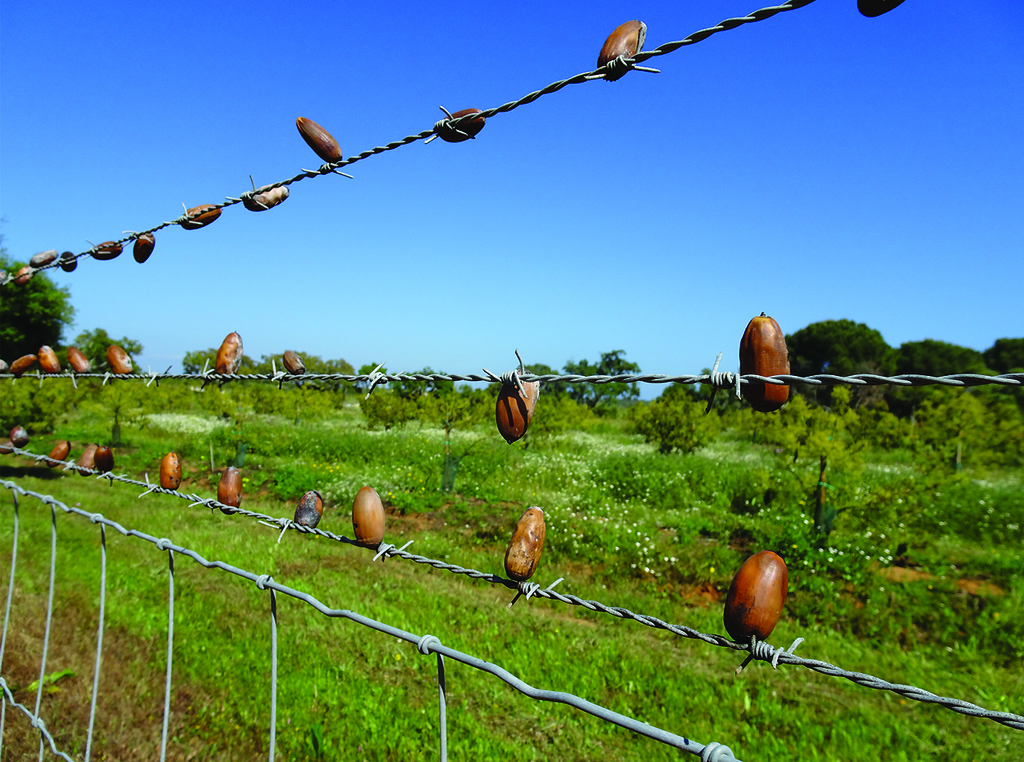Horst adored going to the cinema. He just had too little time, and even less money, to be able to buy a ticket every time. He was lucky enough, however, to live right next to the cinema. On the first floor, above his bar, there was a framed picture in the living room, which covered a hole in the wall, like the one in a camera obscura. One day, he told me his secret. He took the picture down and showed me, with a wink, what could be seen through the hole. And so he swept me away to the wide world of the cinema. Free of charge. Because, through the hole, I had a direct view of the big screen and a film. He placed a stool up against the wall for himself, and a table, opened a beer and turned off the light in the room. Then he made himself comfortable. Of course, Horst always had to watch the films from behind and the wrong way round. The sound in Dolby stereo was often so loud that you could understand all the dialogue in the living room even without a picture. I won’t give any more away, either about the cinema or about Horst.
Luís is an astute businessman. I had asked him for an interview. He turned it down. So, what next? It was just like when we asked the Minister of Agriculture for an interview and he gave “lack of time” as an excuse for many weeks. What nonsense, he had plenty of time. It was just fear of our questions. Let’s be honest, the Minister hasn’t got much of an idea about good agriculture. But he’s good at scheming and negotiating. A party naturally puts such a tried and trusted old man in a ministerial role. He can’t do anything wrong there. He’s in the right place. His civil servants then do all the policy-making in their separate departments.
I now set off to look through the hole for myself. I stand by the fence, which is a good 1.80 metres high and so a fair bit taller than I am, but, despite this, it affords me a view into a different reality: through the holes that are about 15 cm wide, I can see the young trees of the biggest avocado plantation in Europe standing there in lines. Like the fence posts, they have been planted by a machine at a distance of four metres from each other. Can you ram both trees and fence posts into the ground with a machine? That would have been my first question to Luís. I am also interested in technology. But with him too I sensed a certain discomfort when he was faced with my questions. I had the feeling that he knew exactly that he had done something that was not quite right with his mega-project. But what was it that he could have done differently? I wanted to find out, and so started my walk along the fence on the western side, instead of conducting the interview. A perfect day for a walk. The sun is shining and there’s a cool wind. I have a good two and a half hours of intensive walking ahead of me, not only along the Via Algarviana, the popular Algarve hiking trail, but also along a reddish brown path running next to the fence.

The fence in question had been further secured with three rows of barbed wire at the top, stretching from post to post. A measure that is intended to deter me and my gaze, but which, at the same time, draws attention to the fact that something valuable must lie behind this barbed wire fence. Private property, it says on red and white warning signs nailed to the fence. I walk clockwise around the plantation that measures 1,000 by 760 metres. I want to understand Luís.
As I do, I can’t stop thinking about Horst. The German name has its origins in the forest. And that’s exactly where I’m standing, having taken root like a tree. Three years ago, there was no fence here, and the forest continued where the rows of avocado trees are standing today. I imagine how Luís and his brother came to own the forest and the rest of the plot, which is much bigger than just 76 hectares. The previous owner had mortgaged it completely and then lost it to the bank. 150 hectares of fertile land, on which hundreds of cows, horses, goats and sheep once grazed, and a plantation of fig and carob trees once stood. The bank wanted to get rid of it somehow and turn it back into money, with interest and compound interest.
150 hectares of land was supposed to change hands for 800,000 euros. It was haggled over, and the negotiations went to and fro. Firstly it was offered to the neighbours, and then to lots of interested people in the real estate market. The bankers knew nothing about diversity and traditional agriculture, and it took many years until they finally found their purchasers in Luís and his brother. In the Algarve, land is sometimes sold like live chickens at the market. Once they’ve landed in the buyer’s carrier bag, the animal’s life is no longer worth a cent. It is quickly slaughtered and ends up on someone’s plate as galinha cabidela with bloody rice. In 2014, each square metre of the fertile land went for less than 50 cents at the signing of the deed. Huge old cork oaks were sold off, along with stone pines, ancient olive and carob trees, fig and almond trees. I continue walking along by the fence, through shade and sunshine, over the mossy, sandy, flowery forest floor. The film that I watch through the chain-link fence is set in a prison. There are men standing there, working with chain saws. The motors screech and howl. They are felling old stone pines, historic cork oaks, and all the fig and carob trees, which are just the right age to yield a good harvest. But who wants to eat figs these days, or carob? Not long ago, some hikers must have had a bit of fun and stuck a few hundred acorns on the barbed wire. A rather broad hint.
The first kilometre of my walk in the old wood was idyllic. It ended on the northern side. There’s a ruin on the edge of the plot. One the western side of the plot, some of the young trees are already close to two metres tall. But, on the southern side, where my walk will come to an end later, you can see a lot of trees that didn’t survive the winter and, even if they did, are less than a metre tall. I’m just passing a boundary stone and walk along a path that seems to have been drawn with a ruler from north to south, always following the fence. Every step hurts. The little trees stand there, some stunted, beaten, tied up and poisoned with Roundup like at Auschwitz. The film continues and at every step I take I remember what it looked like at the rubbish dump, where I walked around the fence a few weeks ago, where we made a different film and where our civilisation’s leftovers today lie buried. Why do we live like this? Always just in order to earn money? Or is there a higher meaning too? What will we bequeath to our fellow humans when we take our leave of this earth, and what will we take with us?
I walk step by step past old stone walls in front of the barbed-wire fence, come across small abandoned farms, cars that are ready for the scrap heap and no longer driveable, and warehouses whose corrugated iron roofs swing to and fro in the wind, like in old westerns. The area has seen better times. I swing round one more time towards the road that leads to Barão São João. When Portugal joined the EU, traditional agriculture started to die out, slowly and painfully. No minister of agriculture has ever sat down at a table here with farmers and listened to their concerns. None of these big-city politicians has ever put on their working boots and had a look around the country to see how the land is faring and how much rubbish there is lying next to the half-dead fruit trees on another abandoned plantation. The old plastic pipes and fertiliser bags are disintegrating slowly in the sun. Monocultures have an impoverishing effect. It won’t be long before the avocado planation also bites the dust: it’s just a matter of time and circumstances. Good Luck Luís!
 Eco123 Revista da Economia e Ecologia
Eco123 Revista da Economia e Ecologia

